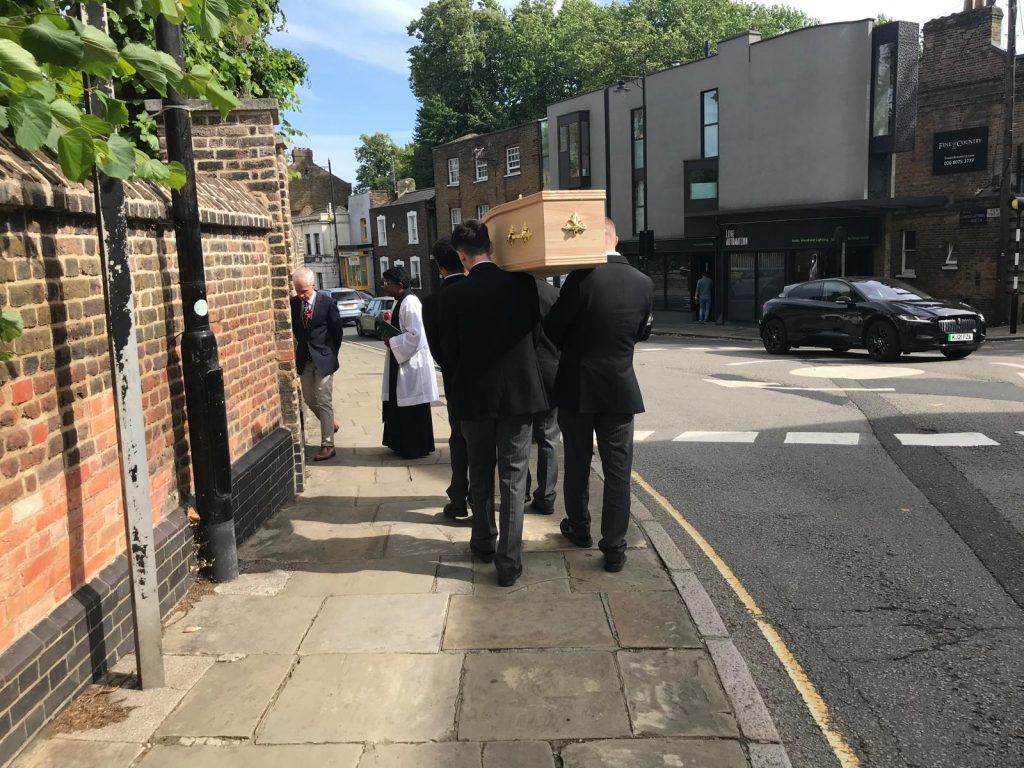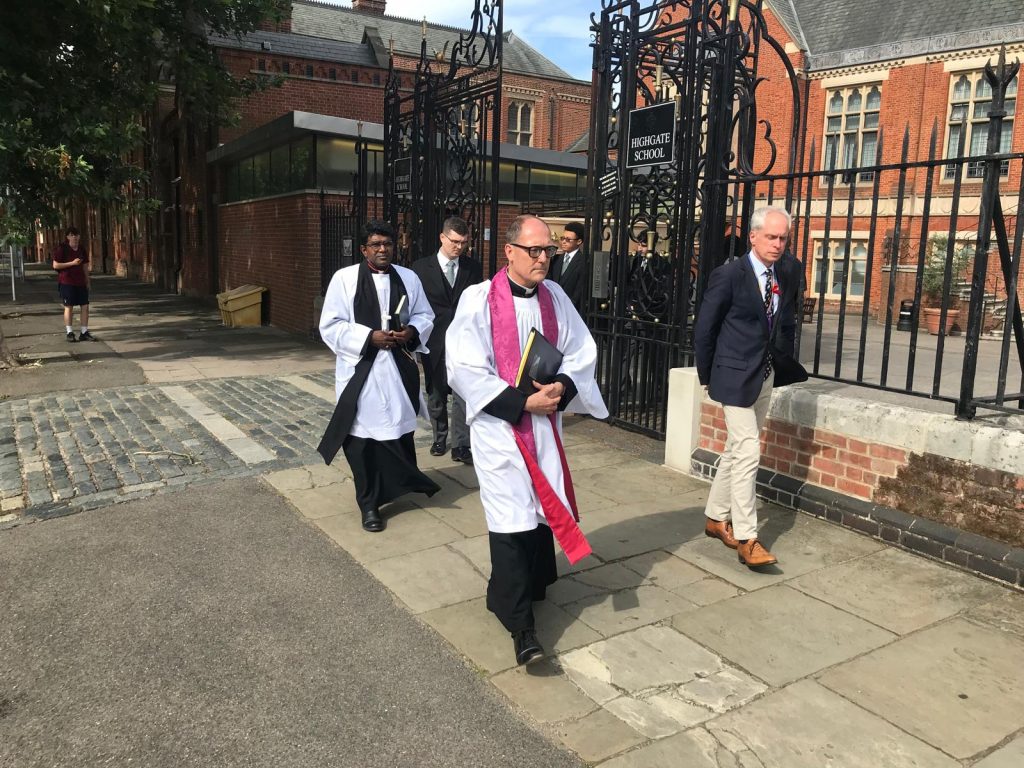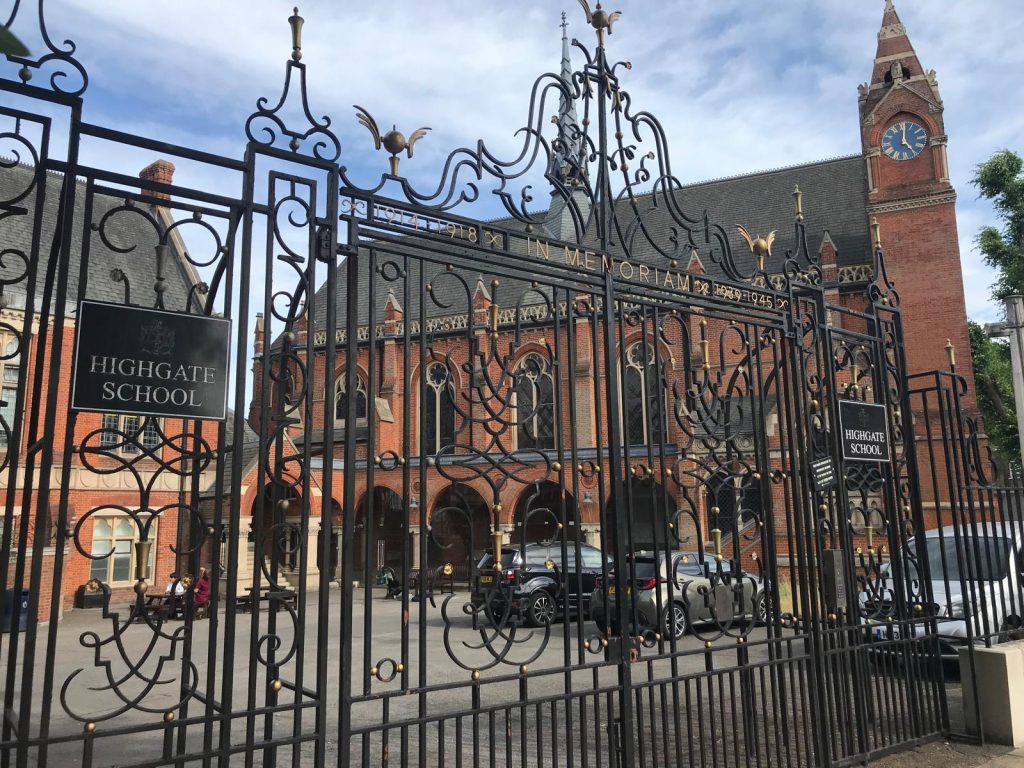School buries 200-year-old human skeleton used in biology classroom
Exclusive: Priests lead procession as bones are brought out in small wooden coffin
Thursday, 3rd July 2025 — By Tom Foot

The skeleton is brought out of Highgate School in a coffin
A PRESTIGIOUS private school has held a burial ceremony for a 200-year-old skeleton it kept in its biology department.
The remains of a woman, described as a “non-European skeleton,” were given a full funeral service by Highgate School, the fee-paying secondary in Highgate Village, on Thursday.
Investigations found she was most likely Indian, aged 20–45, who died from cancer or diabetes. There was evidence of terrible tooth decay.
The New Journal watched as a small wooden coffin was carried into the school’s grounds in North Road in a procession led by headteacher Adam Pettitt.
Reporters were told they could not attend the private ceremony, but the muffled sound of children playing musical instruments and the reading of Christian rites could be heard from beyond a perimeter wall.
“We entrust our sister to your people in the name of Jesus, our Lord,” a robed priest said.
The school said representatives from several faiths had been invited to attend, but no relatives could be contacted. There are no records of who she was or how she came to be in its biology department, the school added.
Highgate School, which has not been accused of any wrongdoing, is understood to have spent three years negotiating with various authorities before the funeral could take place in the adjacent churchyard.

The coffin at the roundabout in Highgate Village
It comes amid calls on the government for reforms to help institutions find dignified solutions to historic human remains previously held for educational purposes.
Human skeletons have been used in schools and universities for decades, but there is no register of provenance and a licence is not required if more than 100 years have passed since death.
Changes in the law have prevented the public display of “relevant material” from a deceased person, leading to many schools like Highgate putting skeletons and bones into boxes in storage. Skeletons have generally been replaced by plastic ones since the 1960s.
A trade in human bones from colonial countries dates back to a dark era of British history, where indigenous people’s graves were often looted for sale on an open market.
Sources close to the Highgate School investigation said the skeleton had been put into storage after being on display for decades in the biology department.
“Initially there was a plan to cremate the bones but this was not allowed,” a source said. “It couldn’t be displayed, it couldn’t be sold or destroyed. So what were they supposed to do? The autopsy showed that the bones belonged to a woman who most likely died from cancer. She had massive decay on her teeth. The bone structure showed that her weight was believed to be 53 kilos, which is hardly anything.”

Priests and headteacher Adam Pettitt at the front of the funeral procession
Former school alumni have told the New Journal that it was widely known among pupils that human bones were held in boxes in the corridors.
Headteacher Adam Pettitt was unavailable for comment, but a Highgate School spokesperson said: “The skeleton has been in our biology department for some time, but there are no available local or archive records to clarify the origin of the skeleton or their next of kin. Following an osteo-archaeology report, we believe the skeleton is that of a non-European woman who died between the ages of 20–45, probably of cancer or a metabolic disorder.
“We have followed national guidance by consulting with the local authority, London Diocesan Registrar and other local representatives and have received a formal Burial Notice. In order to ensure we treat the deceased with dignity and respect, we invited representatives of different faiths to the internment. We received a coroner’s order for burial from North London Coroner Service, signed on May 2, 2025.”
The dark secret in biology departments across the UK
A Labour peer says “urgent” reforms are needed over the ownership of human remains, writes Tom Foot.
Lord Paul Boateng, who led a debate in the House of Lords in March, said a “shaming historic neglect of basic human dignity” was ongoing in this country. His debate had heard how the continued storage of bones in schools and museums can serve as “both a reminder and a cause of great pain to indigenous peoples” who see “the continued holding as reflecting continuing injustice.”
Lord Boateng – a former MP for Brent South and Home Office minister – is campaigning to fully stop the trade of human remains as “objects of curiosity,” and for more to be done to help repatriate skeletons like the one buried by Highgate School this week.
He told the New Journal: “The law and practical guidance in relation to the trade and retention of human remains is either non-existent or outdated and in urgent need of clarification and reform. The days in which the people of other lands and with different coloured skins were felt to be less important in terms of human decency even in death must surely be at an end.
“Action from government is needed now to draw a line under what amounts to a shaming example of historic neglect of basic human decency affecting our relationship with the peoples of so many lands beyond these shores.”

Highgate School in Highgate Village
He added: “Government needs to legislate without further delay to outlaw the abhorrent trade in human remains as objects of curiosity. Institutions and individuals who wish to do the right thing and decently lay to rest skeletal or other human remains, which have come into their possession for whatever purpose in the past, need statutory guidance as to how best to do so.
“Those whose equal rights as human beings have been shamefully disregarded in the past to satisfy the demands and curiosity of the powerful need repatriation where practicable, or at the very least to find final rest in a place of honour — not a cupboard or basement in a foreign land.”
He continued: “The remains of elephants and coral are subject to greater protection than those of the indigenous peoples of previously colonised lands.”
Lord Boateng urged the New Journal to challenge Department of Culture, Media and Sport ministers over what they were doing. They had meetings with him and a leading anthropologist at Oxford University earlier this month.
The debate in Parliament had been triggered by an auction in November 2024 of a 19th-century skull belonging to the Naga people in the north-eastern Indian state of Nagaland. The chief minister of the region had written to the foreign minister objecting, and Lord Boateng said he met with a delegation last month about wider concerns about collections in this country.
In that debate, Baroness Black of Strome (Susan Margaret Black), a leading anthropologist at St John’s College, Oxford, said: “Over time, though, people have started to become uncomfortable about the box of teaching bones in the attic, the skeleton hanging in the school biology laboratory or the articulated foot in the doctor’s surgery, and they wish to divest the responsibility for housing the remains of these unnamed deceased.
“What should we do with all those real bones? Museums will not accept them without a licence and neither will anatomy departments. The Human Tissue Act 2004 provides no assistance for the management of these remains.”
A report by the House of Lords into the issue said that “some human remains were obtained in circumstances that are considered unacceptable” and that those “acquired between 100 and 200 years ago from indigenous peoples in colonial circumstances” were done so “where there was a very uneven divide of power.”
The Human Tissue Act 2004 maps out legal requirements for the trade and retention of human remains in this country, although a spokeswoman for the Human Tissue Authority said its licensing scheme did not apply to any human material more than 100 years old.
The Human Tissue Authority guidance states: “Institutions storing human material removed from the deceased for ‘education or training relating to human health’ require an HTA licence, unless the material was removed from a person who died before September 1, 2006 and more than 100 years have passed since their death.”
The DCMS said they had no response to Lord Boateng’s concerns.